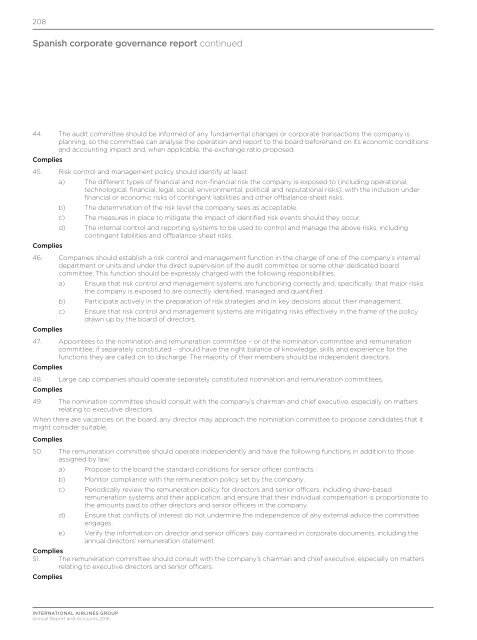Annual report and accounts 2016
You also want an ePaper? Increase the reach of your titles
YUMPU automatically turns print PDFs into web optimized ePapers that Google loves.
208<br />
Spanish corporate governance <strong>report</strong> continued<br />
44. The audit committee should be informed of any fundamental changes or corporate transactions the company is<br />
planning, so the committee can analyse the operation <strong>and</strong> <strong>report</strong> to the board beforeh<strong>and</strong> on its economic conditions<br />
<strong>and</strong> accounting impact <strong>and</strong>, when applicable, the exchange ratio proposed.<br />
Complies<br />
45. Risk control <strong>and</strong> management policy should identify at least:<br />
a) The different types of financial <strong>and</strong> non-financial risk the company is exposed to (including operational,<br />
technological, financial, legal, social, environmental, political <strong>and</strong> reputational risks), with the inclusion under<br />
financial or economic risks of contingent liabilities <strong>and</strong> other offbalance-sheet risks.<br />
b) The determination of the risk level the company sees as acceptable.<br />
c) The measures in place to mitigate the impact of identified risk events should they occur.<br />
d) The internal control <strong>and</strong> <strong>report</strong>ing systems to be used to control <strong>and</strong> manage the above risks, including<br />
contingent liabilities <strong>and</strong> offbalance-sheet risks.<br />
Complies<br />
46. Companies should establish a risk control <strong>and</strong> management function in the charge of one of the company’s internal<br />
department or units <strong>and</strong> under the direct supervision of the audit committee or some other dedicated board<br />
committee. This function should be expressly charged with the following responsibilities:<br />
a) Ensure that risk control <strong>and</strong> management systems are functioning correctly <strong>and</strong>, specifically, that major risks<br />
the company is exposed to are correctly identified, managed <strong>and</strong> quantified.<br />
b) Participate actively in the preparation of risk strategies <strong>and</strong> in key decisions about their management.<br />
c) Ensure that risk control <strong>and</strong> management systems are mitigating risks effectively in the frame of the policy<br />
drawn up by the board of directors.<br />
Complies<br />
47. Appointees to the nomination <strong>and</strong> remuneration committee – or of the nomination committee <strong>and</strong> remuneration<br />
committee, if separately constituted – should have the right balance of knowledge, skills <strong>and</strong> experience for the<br />
functions they are called on to discharge. The majority of their members should be independent directors.<br />
Complies<br />
48. Large cap companies should operate separately constituted nomination <strong>and</strong> remuneration committees.<br />
Complies<br />
49. The nomination committee should consult with the company’s chairman <strong>and</strong> chief executive, especially on matters<br />
relating to executive directors.<br />
When there are vacancies on the board, any director may approach the nomination committee to propose c<strong>and</strong>idates that it<br />
might consider suitable.<br />
Complies<br />
50. The remuneration committee should operate independently <strong>and</strong> have the following functions in addition to those<br />
assigned by law:<br />
a) Propose to the board the st<strong>and</strong>ard conditions for senior officer contracts.<br />
b) Monitor compliance with the remuneration policy set by the company.<br />
c) Periodically review the remuneration policy for directors <strong>and</strong> senior officers, including share-based<br />
remuneration systems <strong>and</strong> their application, <strong>and</strong> ensure that their individual compensation is proportionate to<br />
the amounts paid to other directors <strong>and</strong> senior officers in the company.<br />
d) Ensure that conflicts of interest do not undermine the independence of any external advice the committee<br />
engages.<br />
e) Verify the information on director <strong>and</strong> senior officers’ pay contained in corporate documents, including the<br />
annual directors’ remuneration statement.<br />
Complies<br />
51. The remuneration committee should consult with the company’s chairman <strong>and</strong> chief executive, especially on matters<br />
relating to executive directors <strong>and</strong> senior officers.<br />
Complies<br />
INTERNATIONAL AIRLINES GROUP<br />
<strong>Annual</strong> Report <strong>and</strong> Accounts <strong>2016</strong>



